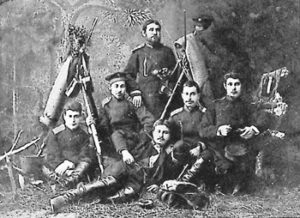Russian May Laws, 1882.
 In 1882, the Russian minister of the interior issued a set of temporary rules that were called the May Laws because they were issued in the month of May. These laws curtailed Jewish residences in villages and started quotas in universities so that students were forced to travel abroad for their education. The May Laws were proposed by Count Ignatiev and sanctioned by the czar on May 3, 1882. They read as follows-
In 1882, the Russian minister of the interior issued a set of temporary rules that were called the May Laws because they were issued in the month of May. These laws curtailed Jewish residences in villages and started quotas in universities so that students were forced to travel abroad for their education. The May Laws were proposed by Count Ignatiev and sanctioned by the czar on May 3, 1882. They read as follows-
1. As a temporary measure, and until a general revision is made of their legal status, it is decreed that Jews be forbidden to settle anew outside of towns and boroughs, exceptions being admitted only in the case of existing Jewish agricultural colonies.
2. Temporarily forbidden are the issuing of mortgages and other deeds to Jews, as well as the registration of Jews and lessees of real property situated outside of towns and boroughs; and also the issuing to Jews of powers of attorney to manage and dispose of such real property.
3. Jews are forbidden to transact business on Sundays and on the principal Christian holy days; the existing regulations concerning the closing of places of business belonging to Christians on such days to apply to Jews also.
4. The measures laid down in paragraphs 1, 2, and 3 shall apply only to the governments within the Pale of Jewish Settlement [that is, they shall not apply to the ten governments of Poland].
Source- Ronald H. Isaacs and Kerry M. Olitzky. Critical Documents of Jewish History, a Sourcebook. Jason Aronson Inc. Northvale, NJ. p. 34.



